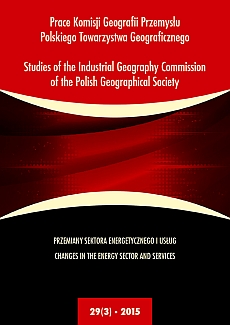The importance of sustainable tourism in the socio-economic development on the example of Croatia
DOI:
https://doi.org/10.24917/20801653.293.5Keywords:
Croatia, economic impact, environmental impact, social impact, sustainable development, tourismAbstract
Tourism is one of the largest and simultaneously the most rapidly expanding industries in theworld. Every year, millions of people across the planet are involved in the act of travelling. When vastnumbers of tourists travel to a particular location, a tourist destination, they have a considerable impacton the local community and environment, spatial planning and more. Moreover, in many regions,tourism is a major source of economic development. However, often the interests of the tourism sectorand the local economy are incompatible with those of the environment. The development of tourism inmany cases can cause many positive changes, such as raising the standard of living, the inflow of capital, although - as often happens - along with numerous positive changes, the development of tourismcan cause a series of negative changes. These are visible, in particular, in air pollution, overexploitationof the environment, lack of respect for a region’s culture and history, such as non-planned activities andbuilding “second homes” near monuments or on a unique green area. So far, the development of tourismwas based on meeting the aspirations of entrepreneurs and tourists, their convenience and interest,without caring about the interests of conserving natural resources or caring for the local community.At present, what is crucial for the successful management and also for the market positioning of eachparticular branch of the economy, especially tourism, is sustainable development. Tourism can also besustainable if the development meets the needs of both tourists and local residents, whilst preservingand protecting both tangible and intangible assets. The aim of this article is the presentation of the principlesof sustainable development based on the example of the tourism sector in Croatia. The objectiveof this study is to analyse the positive and negative impact of tourism on tourist destinations, the localcommunity, the environment and the economy. The author wishes to demonstrate that, by introducinga model of sustainable tourism development, it is possible to achieve an increase in socio-economicgrowth, as well as overall sustainability and balance in the region.Downloads
Metrics
References
Andriotis, K. (2006). Hosts, Guests and Politics – Coastal Resorts Morphological Change. Annals οf Tourism Research, 33(4), 1079–1098.
Butler, R.W. (1980). The Concept of Tourism Area Cycle of Evolution: Implications for Management of Resources. Canadian Geographer, 24(1), 5–12.
Butler, R.W. (1999). Sustainable Tourism: a state of the art review. Tourism Geographies, 1(1), 7–25.
Cohen, E. (1972). Toward a Sociology of International Tourism. Social Research, 39, 164–182.
Doxey, G.V. (1975). A causation theory of visitor – resident irritants: Methodology and research inferences, W: Proceedings of the Travel Research Association 6th annual Conference. San Diego California: Travel Research Association, 98–195.
Działania na rzecz bardziej zrównoważonej turystyki europejskiej. Raport Grupy ds. Zrównoważonego Rozwoju Turystyki (TSG) (2014, 12 grudnia). Pozyskano z http://www.zarabiajnaturystyce.pl
Kowalczyk, M. (2011). Wskaźniki zrównoważonego rozwoju turystyki. Człowiek i Środowisko, 35(3–4), 35–50.
Krstinić-Nižic, M., Drpić, D. (2013). Model for Sustainable Tourism Development in Croatia.
W: Tourism in Southern and Eastern Europe. Conference Proceedings from 2nd International Scientific Conference Tourism in South East Europe 2013. Crisis – a Challenge of Sustainable Tourism Development, 2, 159–173.
Krstinić-Nižic, M., Ivanović, S., Drpić, D. (2009). Spatial planning as the function of sustainability of theisland Krk. Ekonomska istraživanja, 22(3), 98–110.
Mathieson, A., Wall, G. (1982). Tourism Economic, Physical and Social Impacts. London: Longman.
Munasinghe, M. (2003). Analysing the Nexus of Sustainable Development and Climate Change: an Overview. Organisation for Economic Cooperation and Development. Pozyskano z http://www.
oecd.org/dataoecd/32/54/2510070.pdf
Murphy, P.E. (1985). Tourism, a Community Approach. Nowy Jork: Methuen.
Neto, F. (2003). A New Approach to Sustainable Tourism Development: Moving Beyond Environmental Protection. Natural Resources Forum, 27, 212–222.
Petrić, L. (2012). Croatian Tourism Development Model – Anatomy of an Un/sustainability. W: C. Ghenai (red.). Sustainable Development. Rijeka: InTech, 119–147.
Popiel, M., Ziółkowska-Weiss, K. (2013). Croatian Tourism Products as a Tourism Generator and Economic and Social Determinant of this Country. W: J. Wyrzykowski, J. Marak (red.). Tourism Role in the Regional Economy. Regional Tourism Products – Theory and Practice. Wrocław: Wyższa Szkoła Handlowa, 543–554.
Rettinger, R. (2010). Turystyka jako czynnik aktywizacji gospodarki Chorwacji. Przedsiębiorczość– Edukacja, 6, 450–461.
Ruoss, E., Alfarè, L. (red.) (2013). Sustainable Tourism as Driving Force for Cultural Heritage Sites Development Planning, Managing and Monitoring Cultural Heritage Sites in South East Europe.
CHERPLAN project report. Pozyskano z http://www.southeast-europe.net/document.cmt?id=808 Swarbrooke, J. (1999). Sustainable tourism management. Wallingford, UK: CABI.
Tourism in Figures 2013 (2014). Croatia Ministry of Tourism. Pozyskano z http://business.croatia.hr/ Documents/3257/Tourism-in-Figures-2013.pdf
Downloads
Published
How to Cite
Issue
Section
License
Articles are published under the terms of the Creative Commons License (CC BY-ND 4.0; Attribution– NoDerivs).

